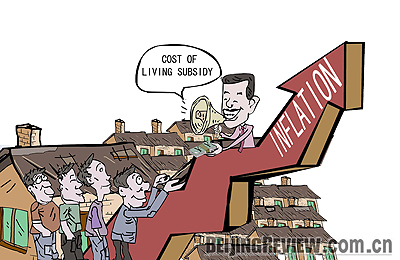|

Impoverished residents of Dongguan have something to smile about, despite being bludgeoned by rising living costs brought on by high inflation. The Dongguan Municipal Government, in south China's Guangdong Province, is handing out 1,000 yuan ($144) cash subsidies to the handicapped and recipients of regular government subsistence allowances who hold permanent residence permits (hukou) in this city. A total of 120 million yuan ($17.57 million) has been budgeted for this purpose and the benefited population is estimated at 122,000.
Dongguan's inflation relief initiative is not the first of its kind, because Singapore and China's Hong Kong and Macao special administrative regions have all launched similar welfare policies earlier this year. The most recent proposal concerning a cash subsidy for the whole nation was proposed by Xing Pu, a member of the Shanghai Municipal Committee of the Chinese People's Political Consultative Conference, the local advisory body, in January. Amid rising prices, Xing said, the state should give every Chinese citizen 1,000 yuan in cash subsidies to ensure an all-inclusive sharing in the benefits of the country's rapid economic growth over the past 30 years. It was soon reported in the media as one of the most controversial policies for poverty relief and public welfare yet seen in China.
The widespread reactions are a result of a widening gap between the growth of state revenues and residential earnings. In 2007, China's gross domestic product (GDP) registered a year-on-year increase of 11 percent and state revenues soared 31 percent to 5 trillion yuan (about $700 billion). In contrast, urban residents' disposable income and rural residents' cash income grew only 12.2 percent and 9.5 percent, respectively, after allowing for inflation. Worse still, the country is suffering from growing inflationary pressure. In February of this year, consumer prices rose 8.7 percent year on year, the biggest leap in 11 years, according to the National Bureau of Statistics. Food prices were the biggest contributor, up 23.3 percent from a year earlier.
Some perceive the cash gift as an effective tool to fight this rampant inflation. But Dongguan, a manufacturing city in the Pearl River Delta, bordering more developed Hong Kong and Macao, is home to a large number of non-resident migrant workers from inland areas, who are not eligible for the cash subsidies. Netizens worried it would create new social inequality.
Experts said the government's subsidies are no better than tax rebates in helping ease inflationary pressure. The authorities should focus more on framing a long-term social welfare system, than giving one-off cash subsidies to the disadvantaged groups, they said.
Better than nothing
Lu Kaisheng (www.hlj.rednet.cn): It demands strong financial support to achieve social justice and equality, and redistribution of social wealth is a major tool to promote the process, through which part of the state
|
